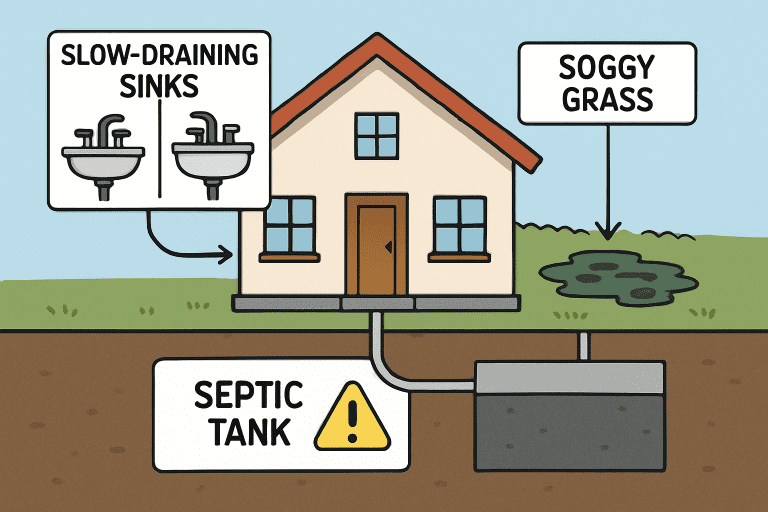How to Respond Quickly to Septic Tank Emergencies

Key Takeaways
- Recognize the early signs of septic tank emergencies and system failure to prevent more severe issues.
- Act immediately to septic tank emergencies to minimize damage and protect your family’s health.
- Adopt preventive habits and regular maintenance to reduce future emergencies.
A septic tank emergency can disrupt daily life, leading to expensive repairs, property damage, and health risks if not addressed quickly. Signs such as odors or wastewater backups should be addressed immediately. Early recognition and prompt action can prevent minor issues from becoming major problems. Regular maintenance reduces anxiety, helps identify warning signs early, and ensures the system functions optimally. Neglecting septic systems can cause severe, long-lasting damage, including contaminated soil and exposure to bacteria. Educating yourself now can help you avoid stressful future emergencies and protect your home and health.

Recognizing Signs of a Septic Emergency
Staying vigilant is the first defense against a septic backup emergency. Early warning signs typically start small but can quickly snowball if ignored.
- Slow-Draining Fixtures: If you notice that your kitchen sink not draining or you find that your toilets, bathtubs, or laundry machines draining slowly, this often indicates clogs or developing blockages in the septic line.
- Unpleasant Odors: Persistent foul smells, especially near your drain field or inside your home, are strong indicators of system malfunction or leaks.
- Water Pooling: If you notice soggy patches or lush, bright green grass in your yard (especially around the drain field), it could mean wastewater is escaping and not being properly processed.
- Sewage Backups: Any instance of sewage backing up through your drains is a serious emergency that requires immediate attention.
Immediate identification of these symptoms is critical in preventing significant regulatory violations, environmental contamination, and household disruption. For more details about the signs of septic emergencies, authoritative resources from the U.S. Environmental Protection Agency provide up-to-date guidance.
Immediate Actions to Take
When a septic emergency is suspected, swift and deliberate action minimizes harm:
- Cease Water Usage: Immediately stop using water-intensive appliances and fixtures—such as dishwashers, washing machines, showers, and toilets—to prevent adding more water to a stressed system.
- Avoid Contaminated Areas: Stay away from any zones where sewage has pooled or is backing up, as direct contact with waste carries significant health risks.
- Contact Professionals: Promptly get in touch with a licensed septic service provider with emergency capabilities to assess, diagnose, and address the situation before it worsens.
Prompt professional intervention is essential, as professionals have the tools to safely assess the septic system and address the root cause of the emergency.
Preventive Measures to Avoid Future Emergencies
Routine septic maintenance is the most effective safeguard against emergencies. Following these preventive tips ensures your system runs efficiently year-round:
- Routine Inspections: Schedule professional inspections and pump-outs every 3 to 5 years, or as advised based on household size and water use.
- Mindful Usage: Never flush non-biodegradable objects or pour fats, oils, or large quantities of chemicals down drains. These materials can quickly clog pipes and disable septic bacteria needed for effective breakdown.
- Protect the Drain Field: Keep cars, trucks, and deep-rooted plants well away from your septic field to prevent soil compaction and pipe damage— two frequent contributors to system failure.
For more advice on keeping your septic system healthy, CDC guidance on septic system safety is a helpful resource.
Understanding the Role of Septic Alarms
Modern septic systems often include electrical monitoring devices that activate an alarm when the water level in the tank rises too high, indicating a potential failure. If you hear the alarm:
- Reduce Water Usage: Use as little water as possible until the issue is resolved.
- Check the Alarm: Determine if the alarm is caused by a power outage or by a malfunction in the septic system itself.
- Seek Professional Help: Call your septic maintenance provider for immediate service and avoid attempting DIY repairs on the electrical components.
Paying attention to your system’s warning mechanisms provides critical time to intervene before backups occur.
Health Risks Associated with Septic Failures
Exposure to untreated wastewater is not only unpleasant— it’s dangerous. Consequences include:
- Gastrointestinal illnesses from ingesting bacterial contaminants.
- Skin or eye irritations upon contact with polluted water.
- Potential transmission of viral, bacterial, or parasitic infections.
If exposure occurs, wash thoroughly with soap and water and seek medical attention for any signs of illness, particularly in children or elderly individuals.
When to Seek Emergency Services
In certain situations, prompt professional assistance is the safest and most effective solution. Reach out immediately when you face:
- Sewage Backups: Any occurrence of wastewater coming back into your home.
- Persistent Odors: Continuous foul smells despite attempts at maintenance or cleaning.
- Alarm Activation: Whenever your septic system alarm sounds, and the issue is unclear or unresolved.
It’s always better to err on the side of caution— septic emergencies can escalate quickly, and the cost of professional services is almost always less than the cost of recovering from systemic failure or health crises.
Conclusion
Being proactive and well-informed about septic emergencies allows homeowners to minimize damage, safeguard their families, and avoid costly repairs. Through regular inspections, mindful water use, and instant response during emergencies, you can keep your septic system running smoothly and prevent disruptions that threaten your safety and comfort.

